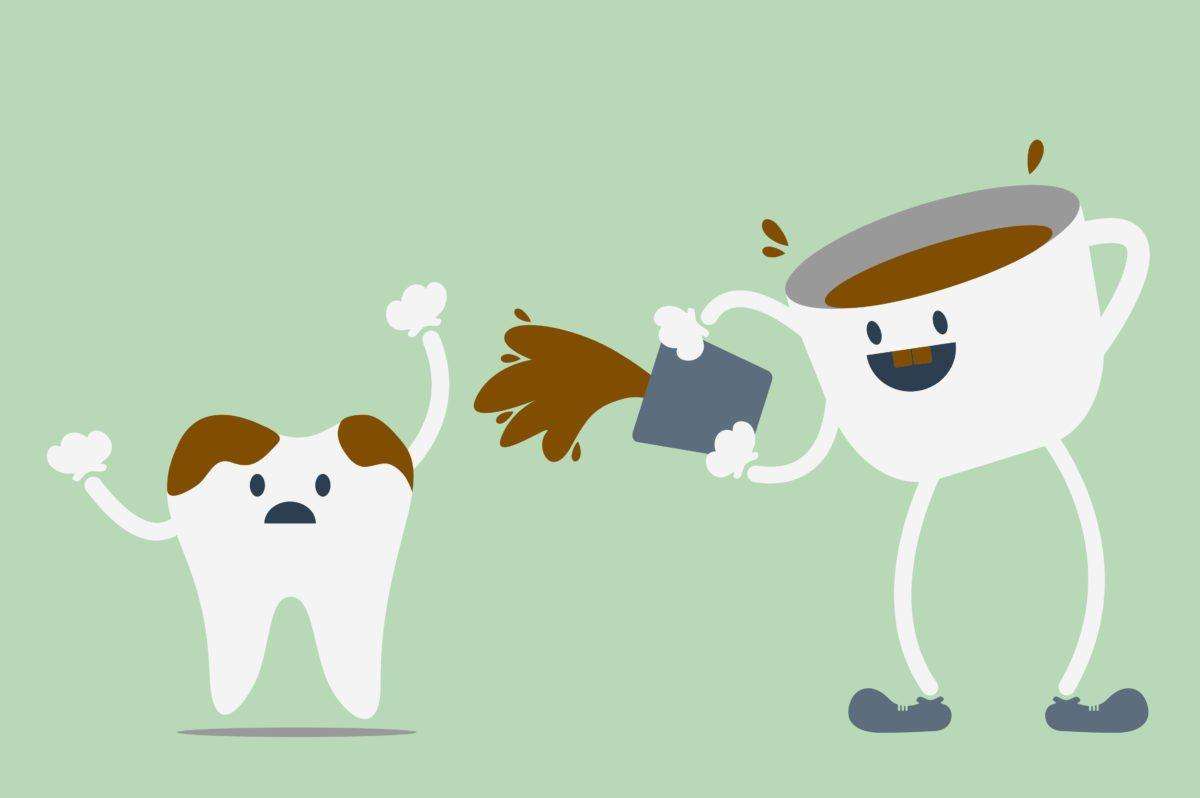Let’s face it: most of us don’t want to imagine trying to make it through the work day without a cup of joe. In fact, according to Havard’s School of Public Health, 54% of Americans over the age of 18 drink coffee every day. Of that 54%, the average amount consumed per day is 28oz, and dollars spent on coffee per year is over $40 billion. Very impressive numbers for a beverage that gets a bad rep for its affect on the human body.
There has always been speculation about the effects of coffee on oral health. Questions about staining and acidic content wearing out enamel probably come up in dental offices more than we think. Although haphazard coffee consumption can have negative affects on your oral hygiene, it isn’t all bad. Let’s dive into a few positives about our favorite morning beverage and how to carefully consume.
How can coffee help my oral (and overall) health?

- Possible protection against gum disease?
In an article published by Men’s Health, researchers from Boston University found that those who drank coffee were protected against gum disease. They did admit however that were not entirely sure what was going on, but that antioxidants in coffee could be playing a role. The study was conducted on more than 1,000 men for up to 30 years, and it found that those who drank one or more cups of coffee each day had fewer teeth with bone loss. “They could be muting the body’s own inflammatory processes that normally would be harmful to the gums and the jawbone supporting the teeth,” said Raul Garcia, DMD who authored of the study.
- Less risks for diseases outside of oral health
Take a second look at the research done by Harvard’s School of Public Health. They offer a well-designed, interactive infographic that explains both pros and cons to coffee drinking, which includes positive outlooks on prevention from many non-oral related diseases. Some of theses diseases coffee can lessen a risk of include diabetes, liver cancer, gallstones, and Parkinson’s. (Note from their site: These studies are observational, meaning that researchers draw conclusions based on differences between the number of disease cases in coffee drinkers versus non-drinkers.)
What about avoiding the infamous “coffee smile”?
Limiting the wear and tear on your pearly whites can be quite the task for some, especially when coffee is a part of their every day diet. Most people don’t know that although your teeth feel smooth, microscopically it’s a different world. Colgate points out that there are pits and ridges that can fill with food and drink particles and over time build up. Without the proper attention and care to what is hitting the inside of your mouth, teeth stains can most definitely become a visible issue. As a general rule of thumb: if it can stain your clothes, it can stain your teeth.

No one believes giving up coffee altogether is a practical solution to preventing teeth staining. Luckily, there are ways to minimize and cut down on this from happening. Here are a few of our best tips:
- Limit, limit, limit. Instead of casually sipping throughout the day, maybe cut it down to one in the morning and one in the afternoon.
- Rinse with water. This will get rid of those nasty particles that stick around inside crevices and cause staining later.
- Use a whitening toothpaste. Go into any pharmacy near you and you’re bound to find an entire aisle full of different kinds varying in cost and size.
- Schedule regular cleanings with your dental hygienist. The cleaning and polishing tools your friends in the hygiene department use in your mouth will help keep a white smile.
- Drink cold coffee through a straw. The usage of a straw avoids a lot of contact with the teeth. And since hot coffee has been known to cause more stains than cold coffee, maybe trying some cold brew is an area to dive in to.
- Eat more strawberries than ever before. Strawberries have been found to be natural teeth whiteners because of their teeth-whitening enzyme of malic acid.
Why does any of this matter?
Our main goal of compiling all of this research and information together for you is to say that coffee isn’t something you need to give up to maintain good oral health. Sure, it’s not the best thing to drink and leave sit on your teeth for long periods of time because it will stain, just like many other drinks. However, by following these and many other credible tips, you can have your coffee and drink it too. At the end of the day, just be conscious of your coffee intake, cleaning your teeth, and scheduling regular dental cleanings.
Have any tips or favorite brews you want to share? Let us know in the comments! Also, be sure to join the conversation with us on Twitter! #NationalCoffeeDay is happening all day today (September 29th) and you can find local stores with pretty awesome deals.


Limiting the wear and tear on your pearly whites can quite the task for some, especially when coffee is **apart** of the every day diet.
The Import Ants of Proofreading
Thanks for the catch, Joseph. The wonders a spacebar can do!
Limiting the wear and tear on your pearly whites can “be” quite the task for some, especially when coffee is **apart** of the every day diet.
Yes, proofreading is important.